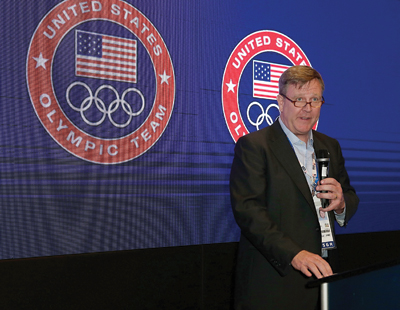With the Sochi Games behind it, the U.S. Olympic Committee plans to turn its attention to a potential bid for the 2024 Summer Games.
International Olympic Committee members have encouraged the U.S. to bid, and the USOC is intent on selecting a potential bid city by the end of the year. Candidates include San Francisco, Boston, Los Angeles, New York City, Dallas, Philadelphia and Washington, D.C. IOC members are said to favor a bid from San Francisco, but the USOC hasn’t identified a favorite.
 |
USOC CEO Scott Blackmun will be meeting mayors.
Photo by: GETTY IMAGES
|
USOC Chief Executive Officer Scott Blackmun said the organization will spend the rest of the year meeting with mayors and city leaders to evaluate the viability of a bid from each city. It hopes to select a city by the third quarter of this year and have its board vote by March 2015 on whether the U.S. will put forward a bid.
“There’s no matrix for how we’ll choose a city,” Blackmun said. “There’s no scoring system. It’s going to be which city has the most voter appeal, which city can provide the best
{podcast}
SBJ Podcast:
From Sochi: Olympics writer Tripp Mickle assesses the Sochi Games with Terrence Burns, managing director of Teneo, who helped Sochi secure the 2014 Winter Olympics.
experience to athletes, which city can provide the best experience for spectators and which city has the best economic situation to host a Games. We don’t want to take substantial financial risks.”
The U.S. hasn’t hosted a Summer Olympics since the 1996 Atlanta Games. It last hosted a Winter Olympics in 2002 in Salt Lake City. Bids by New York for the 2012 Games and Chicago for the 2016 Games were rejected by the IOC.
A bid for the 2024 Summer Games would face stiff competition. Rome and Paris, which would be celebrating the centennial of its second Olympics that year, both plan to bid. Doha, Qatar, and South Africa also have expressed interest.
Blackmun said that the competition a U.S. bid city faces wouldn’t weigh heavily on the USOC’s decision to put forward a bid.
“We need to determine whether we can put forth a quality bid that can win,” he said. “If we think we will do that, we will bid irrespective of what other cities are in the process.”
When it selected Chicago as a bid city for the 2016 Games, the USOC held a domestic bid process and picked the Illinois city over Los Angeles. It plans to forgo that process this time because the cost for bid cities can be more than $10 million.
“The more formal you make the process, the more difficult you make it for the cities that don’t win,” Blackmun said. “We want to build the Olympic movement in the U.S. We want to designate a partner but not alienate cities as we have in the past.”
The less formal approach also gives the USOC the flexibility to not put forward a bid if it doesn’t find a city it believes can win. The organization has said that if it doesn’t bid for 2024, it will look at bidding for the 2026 Winter Games. Cities such as Salt Lake, Reno-Tahoe and Denver have expressed interest in those Games. But for now, the focus is on the 2024 Summer Games.
The USOC has spent the last four years restoring its standing in the international Olympic movement. It reworked its revenue-sharing agreement with the IOC, and Blackmun and USOC Chairman Larry Probst have worked hard to build relationships with IOC members and sports federations.
The result of their efforts was evident last year when Probst was made an IOC member.
“The U.S. Olympic Committee under its leadership [has] moved mountains of perception of the USOC in the IOC, and they’ve done that not to bid but to benefit the Olympic movement, and people respect that,” said Terrence Burns, an Olympic bid consultant and marketer who works for Teneo Holdings.
Some of those efforts were undermined by the Obama administration’s decision not to send a senior member of its leadership to the opening ceremony of the Sochi Games. Instead, it sent a group of openly gay athletes in a political statement, which IOC President Thomas Bach criticized prior to the Sochi Games, saying the Olympics weren’t a place for politics.
“I don’t think the U.S. political performance the last month will be helping [a bid],” said Michael Payne, the IOC’s former director of marketing. “There’s the potential it might become quite a competitive race.”




